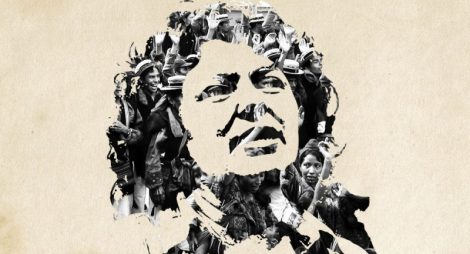“Berta lives on, she lives with the Lenca people fighting against those who are trying to loot their territories, with women standing up to defend their rights, in the peoples’ struggles for water and life. Berta lives on in the heart of all rebels!” Proclaimed the Civic Council of Popular and Indigenous Organizations of Honduras (COPINH).
On 2 March 2016, the defender of the Lenca people, Berta Cáceres, was murdered at her home in La Esperanza, Intibucá. During the attack, Gustavo Castro [1], member of Otros Mundos-Friends of the Earth Mexico [2], was also injured.
The case’s trial [3] saw numerous delays and postponements, while the Court denied both COPINH’s lawyers and Cáceres’ relatives from acting as plaintiffs. In the end, only the direct perpetrators were prosecuted, despite evidence gathered by the indigenous organization on the involvement of several members of the Board of Directors of the company DESA in masterminding the crime.
Cáceres was the leader of the struggle against DESA’s Agua Zarca project to build a hydroelectric dam on the Gualcarque River.
COPINH stressed that the authorities must prosecute the masterminds of her murder, such as David Castillo, the manager of DESA who was arrested two years ago with a pending trial, and members of the Atala Zablah family. The organization urged the Public Prosecutor’s Office to “stop making excuses for not prosecuting Daniel Atala Midence, José Eduardo Atala Zablah, Pedro Atala Zablah and Jacobo Atala Zablah, among others,” for Berta’s femicide.
“Throughout the process we’ve seen different circumstances that show the structural weaknesses of the system, which continue to limit and challenge the Honduran peoples’ access to justice”, said Reynaldo Villalba, human rights attorney. Villalba is a member of the José Alvear Restrepo Lawyers Collective (CAJAR) in Colombia, Vice-President of the International Human Rights Federation (IHRF), and he participated in the International Observation Mission to assess the 2018 judicial process where seven perpetrators were convicted [4] – hitmen, former DESA employees and members of security forces.
“This Mission reminds the Honduran State that by not protecting legal assets such as the right to the truth and due process, they could be compromising other fundamental rights. Because of these weaknesses, the State is not able to guarantee that serious human rights violations such as the Berta Cáceres case will not happen again,” said Villalba, summarizing the “Historical debt of justice” report submitted by the Observation Mission on 11 February in Honduras.
The Honduran and international human rights organizations that formed the Qualified Observation Mission also criticized the fact that the alleged masterminds have not been prosecuted four years following the political femicide.
“Berta Cáceres was at great risk before her murder, due to her work as an indigenous leader for Rio Blanco communities,” stressed Joseph Berra, US lawyer and Project Director at UCLA’s Promise Institute for Human Rights, during the presentation of the report. “Although she denounced the attacks and threats against her in the context of the implementation of the DESA project, the Honduran State failed to comply with its duty of protection, despite the precautionary measures granted by the IACHR.”
“The murder of Berta Cáceres has affected direct victims and society as a whole. That is why the search for truth and integral justice is imperative,” states the Mission report.
WE ARE OUT OF TIME
Four years after her murder, the words Berta Cáceres spoke when she accepted the Goldman Prize [5] (for grassroots environmental heroes) in 2015 resonate stronger than ever. Back then, she called on us to wake up as human beings, she invited us to follow the cry of the Gualcarque River, Río Blanco and to build “societies that are able to coexist in a dignified way, in a way that protects life.”
“Our Mother Earth – militarized, poisoned, fenced-in, a place where basic human rights are systematically violated – demands us to act. Wake up, humankind. We are out of time!”
